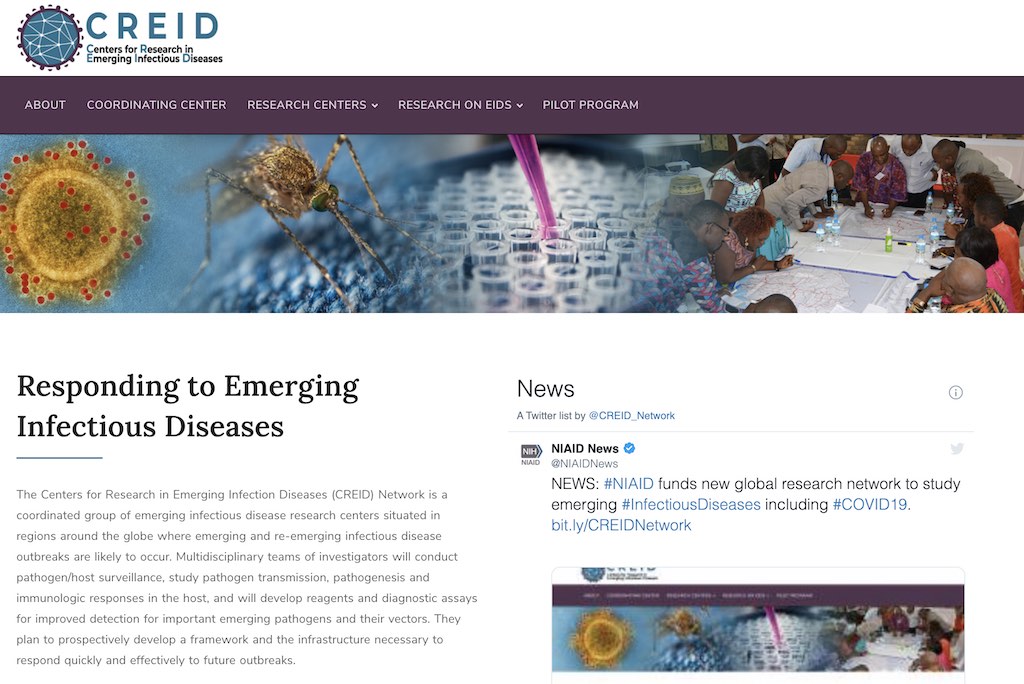The ongoing COVID-19 pandemic has exposed the urgent need to protect the world from microbial threats, whenever and wherever they emerge.
With a new $8.9 million grant, several CViSB investigators are partnering with peers in the United States and West Africa, a region of the world where infectious diseases are a high burden on public health. Together, we will seek to improve our understanding of emerging and re-emerging infectious diseases and develop a scalable response network to rapidly address outbreaks.
“COVID-19 has made it abundantly clear that proactive infectious disease surveillance should be an ongoing priority, along with better local and global strategies for detecting, mitigating and preventing outbreaks,” says Kristian Andersen, PhD, Director of CViSB, and one of seven key investigators on the grant. “Only then is it possible to respond effectively to pandemic threats.”
The five-year grant, awarded by the National Institute of Allergy and Infectious Diseases (NIAID), part of the National Institutes of Health (NIH), will establish the West African Emerging Infectious Disease Research Center, bringing together clinicians, epidemiologists, bioinformaticians and biologists from the United States, Sierra Leone, Nigeria, Liberia and Senegal. The center builds on more than a decade of collaboration and experience establishing research infrastructure and scientific expertise in West Africa.
The team will focus on emerging pathogens that pose the highest risk to national security and public health. These include SARS-CoV-2, the virus responsible for the COVID-19 pandemic, as well as the Ebola and Lassa viruses. More broadly, the scientists will concentrate on known and novel RNA viruses, for which surveillance gaps can be widespread. In addition, through technology development, training, and improved scientific and administrative infrastructure, the team will work to mitigate future pandemic threats.
Understanding how new threats arise
The fast-growing region of West Africa, which encompasses 16 countries and a population of more than 365 million, harbors a disproportionate infectious disease burden. The region is vulnerable to acute outbreaks, as witnessed in recent years with Ebola virus disease and Lassa fever.
As part of the newly launched center, scientists will investigate the prevalence, dynamics and genomic epidemiology of SARS-CoV-2, Lassa virus and other RNA viruses in Sierra Leone, Nigeria, Liberia and Senegal. This will help in understanding how these viruses emerge and spread as outbreaks turn into large-scale epidemics.
A comprehensive survey of known, emerging and novel RNA viruses will help determine critical threats circulating in both human populations and animal reservoirs.
Building a ‘rooted’ network that can mobilize
As COVID-19 has shown, when local, national and international responders are caught off guard, local outbreaks can rapidly escalate into global pandemics. To effectively respond to new viral threats, investments in local research infrastructure—including enhanced diagnostic capacity, pathogen discovery and surveillance—is needed.
The newly funded center aims to address these key areas by designing and implementing novel field-deployable diagnostic tests, expanding resources for virus sequencing and pathogen-specific assays. The team will also develop frameworks for rapidly sharing genomic, clinical and epidemiological data.
“We use the term ‘rooted research’ to describe our efforts to establish a firm foundation in countries where the viruses we study are endemic,” says Andersen. “Co-creation, capacity building through training and investments in scientific infrastructure, and partnerships built on trust and openness are key to our ability to quickly and effectively mobilize in an outbreak situation.”
In addition to Andersen, six other researchers from the United States and West Africa will serve as lead investigators on the grant, including:
- Mosoka Fallah, PhD, MPH, Director General of the National Public Health Institute of Liberia
- Robert Garry, PhD, Professor and Assistant Dean at Tulane University School of Medicine
- Donald Grant, MD, MPH, District Medical Officer at the Kenema Government Hospital in Sierra Leone
- Christian Happi, PhD, Professor at the Department of Biological Sciences at Redeemer’s University in Nigeria
- Daouda Ndiaye, PhD, Professor of Parasitology and Mycology at Cheikh Anta Diop University in Senegal
- Pardis Sabeti, MD, DPhil, Professor at the Department of Organismic and Evolutionary Biology at Harvard University, Institute Member at the Broad Institute, and Howard Hughes Investigator.
The grant number is U01AI151812. The award is one of 11 grants made by NIAID to establish a network of Centers, including a Coordination Center, around the globe where emerging and re-emerging infectious disease outbreaks are likely to occur. Multidisciplinary teams of investigators in the program will conduct pathogen/host surveillance, study pathogen transmission, pathogenesis and immunologic responses in the host, and will develop reagents and diagnostic assays for improved detection for important emerging pathogens and their vectors. For more information, visit creid-network.org.
